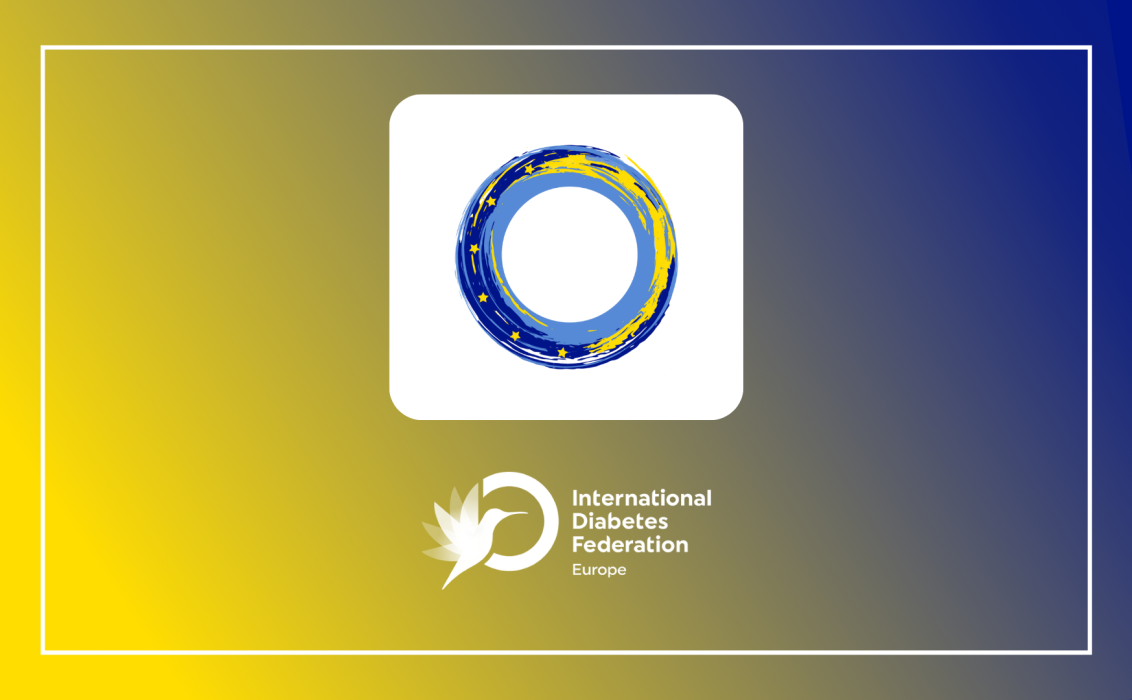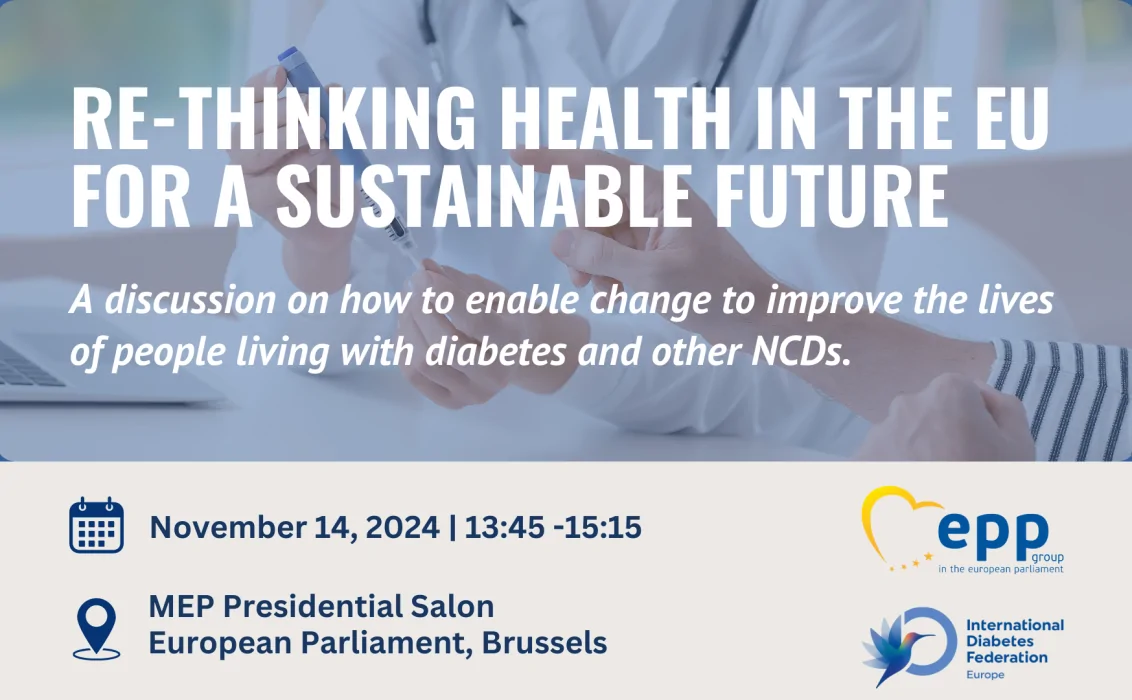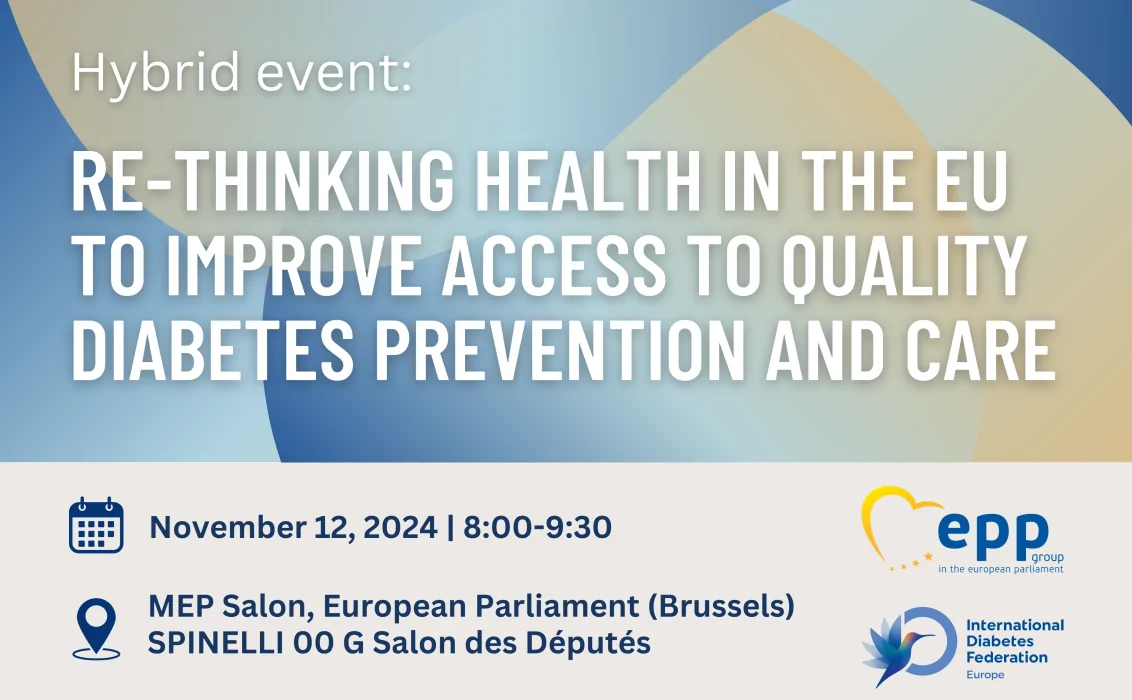- On the first anniversary of the European Parliament resolution on prevention, management and better care of diabetes in the European Union (EU), IDF Europe is calling on the establishment of a comprehensive European Plan for Diabetes, building up the resilience of national healthcare systems in the face of potential future health crises.
- While advances in medicines, technologies, and therapies offer great hope, existing diabetes prevention and management practices continue to fail the 32 million people living with diabetes across the EU, a third of which are still undiagnosed.
- Against this background, a few days before the High-Level Technical Summit (HLTS) on diabetes organised by WHO Europe and the International Diabetes Federation Europe (IDF Europe) in Belgrade, IDF Europe urges strong political will and commitment to address diabetes, going beyond addressing prevention.
- A European Plan for Diabetes should: address fundamental health determinants and promote health-centric environments; allocate appropriate public funding to more research and the adoption of digitalisation, AI and innovation; champion empowerment of people living with diabetes and inclusive decision-making; and promote universal, timely access to high-quality care, medicines and technologies for all.
On this day, one year ago, the European Parliament took a historic step by adopting a resolution urging the European Commission and Member States to intensify efforts to address the vast and escalating public health challenge that diabetes represents and propose an effective action plan for its prevention and management.
Today, some 32 million people live with diabetes in the EU. In addition to the ever-growing number of people living with the condition, the hidden crisis lies in the fact that one third of people living with diabetes remain undiagnosed. Moreover, up to 35% of people living with diabetes already show signs of complications at diagnosis and about three-quarters of the diabetes-related health expenditure in Europe results from often preventable complications. The human stories behind these statistics resonate deeply, highlighting the emotional toll of diabetes on individuals and communities.
Beyond its impact on people living with the condition, their families and carers, at a public health level, effective diabetes prevention and management is also a marker of health systems’ resilience. Diabetes is a hugely complex condition to prevent and manage, and one which interplays extensively with other conditions and with all levels of care. As such, developing and implementing effective diabetes prevention, management and care practices does not only benefit people living with chronic conditions: it builds up the resilience of national healthcare systems in the face of potential future health crises.
One hundred years after the breakthrough discovery of insulin, we are again on the verge of a major revolution in the prevention and management of diabetes. Alongside novel, disease-modifying medicines and advanced technologies supporting for example precise glycaemic control, advances in cell therapies bring the possibilities of a cure ever closer. Recent medicinal developments are also pushing the boundaries of prevention, making it for the first time possible to delay the onset of Type 1 diabetes for an average of two years in some population groups. The digitalisation of health systems coupled with broader use of AI also pave the way for an overhaul of our prevention and treatment approaches.
Despite these promising innovations, existing diabetes prevention and management practices continue to fail people. What we need now is strong political will and commitment. The COVID-19 crisis showed us what is possible when there is determination to act.
At a pan-European level, the European Commission’s response to improve the early diagnosis and management of the condition, rather than simply address prevention, has remained largely insufficient.
One week after World Diabetes Day, we want to re-affirm the urgent need to find sustainable political solutions placing diabetes at the forefront of the EU’s public health priorities, turning the EU into a beacon of progress in the field of healthcare which, as the COVID pandemic demonstrated all too painfully, underpins our economic stability and prosperity. The science is there, we need political will to implement it.
On the first anniversary of the EP resolution on diabetes, we thus call on the European Commission and European political parties to work together with people living with diabetes, healthcare professionals and other diabetes stakeholders to establish a comprehensive European Plan for Diabetes. This Plan must go beyond just setting goals. Instead, it must actively, creatively, and continually leverage novel approaches, tools and technologies to curb the rise in new diabetes cases and improve care and quality of life for the 32 million people already living with the condition in the EU.to effect a transformative change to diabetes and public health in the EU.
Concretely, we call on for an EU Diabetes Plan which:
- Considers health in all policies, address fundamental health determinants and promote health-centric environments.
- Allocates appropriate public funding to more research and the adoption at scale of digitalisation, AI and innovation – in all its forms – to:
- Foster the development of virtuous healthcare pathways, providing support for, and education to healthcare professionals for the implementation of the latest evidence-based guidelines.
- Address the critical shortage of healthcare professionals.
- Support Member States in developing personalised and integrated care pathways.
- Champions empowerment of people living with diabetes and inclusive decision-making, so that people living with diabetes are at the vanguard of innovation.
- Promotes universal, timely access to the required high-quality care, medicines and technologies for all.
As we envision a future where diabetes is not just managed but mastered, it is also essential to unite, collaborate, and strategize to address the complex challenges brought by diabetes.
Elisabeth Dupont, Regional Director of International Diabetes Federation Europe, said: “Our ambition for people living with diabetes and those at risk is not just a medical but also a moral imperative. We must innovate and act decisively, reassessing our strategies to ensure every policy, every initiative, contributes to a healthier, diabetes-free Europe. It’s a matter of public health, social justice, and political will”.
The upcoming High-Level Technical Summit (HLTS) on diabetes, which is organised by WHO Europe and the International Diabetes Federation Europe in Belgrade on November 28-29, represents a crucial convergence of experts, healthcare professionals, and people living with diabetes. This summit should serve as a blueprint for a healthier Europe, aiming to refine diagnosis, improve prevention, enhance care, and guarantee equitable treatment. The voices of those living with diabetes will guide our strategies to ensure they resonate with real-world needs.
We eagerly await the outcomes of the summit. Together, we are committed to improving the lives of all Europeans, including those living with diabetes.
About IDF Europe:
IDF Europe is the European chapter of the International Diabetes Federation (IDF). We are an umbrella organisation representing 73 national diabetes organisations in 46 countries across Europe. We are a diverse and inclusive multicultural network of national diabetes associations, representing both people living with diabetes and healthcare professionals.
Point of contact: Sabine Dupont, Director, Strategy and Policy : [email protected] or +353 89 708 6565
International Diabetes Federation Europe :
Avenue du Bourg. E. Demunter 5 Box 10, B-1090 Brussels, Belgium



